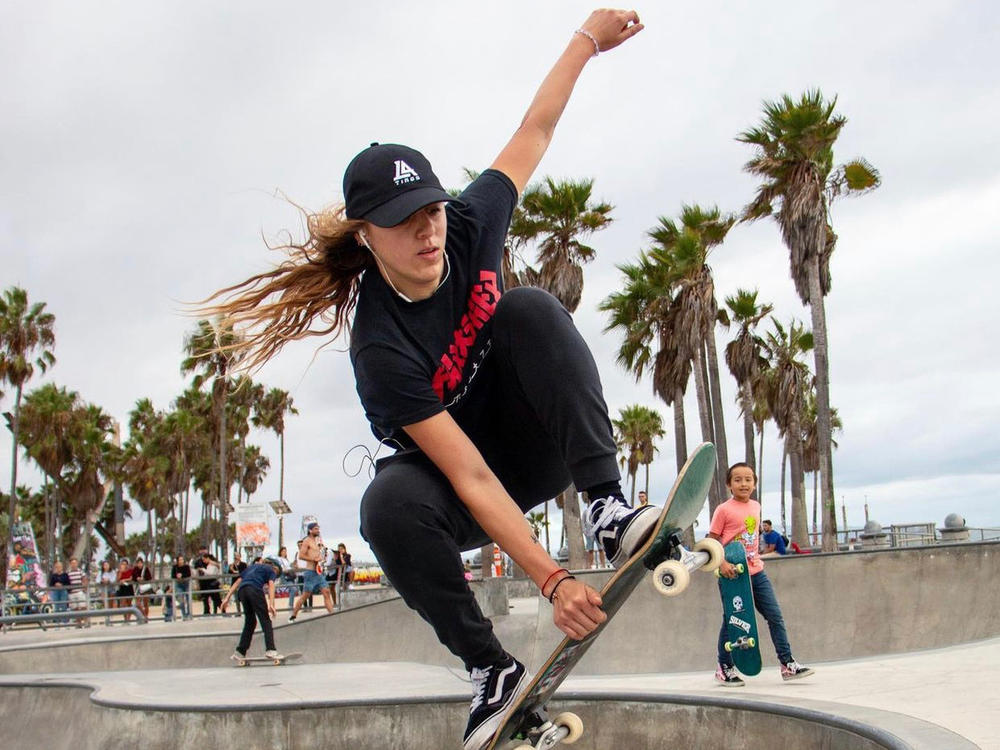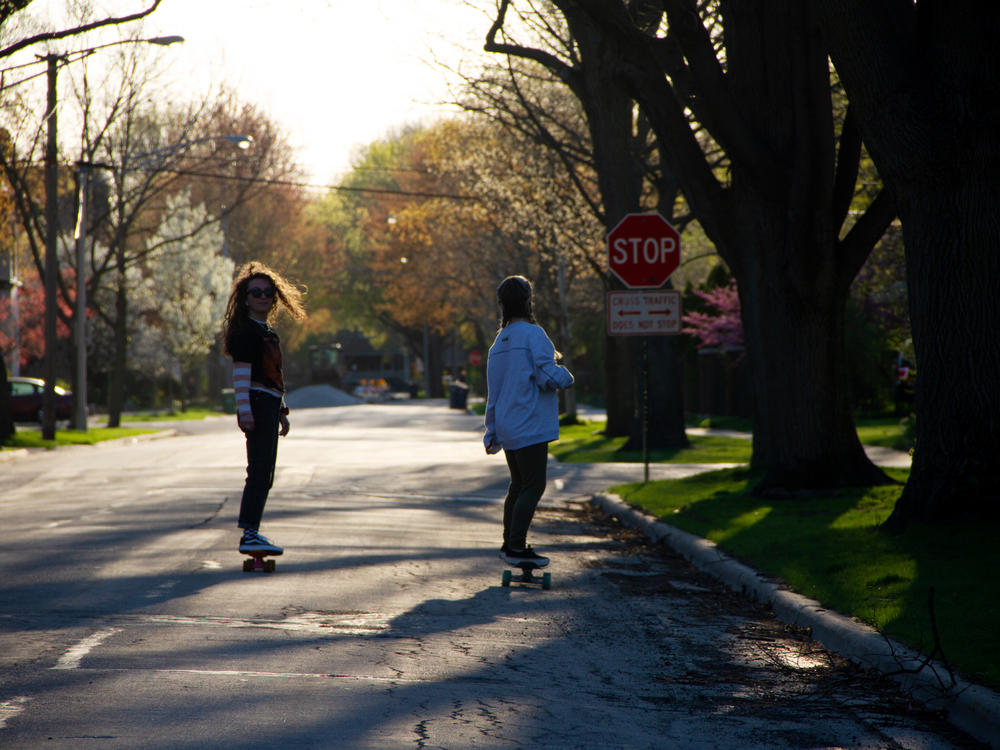Section Branding
Header Content
How TikTok And Skater Girls Are Sending Skateboard Sales Off The Wall
Primary Content
My orange skateboard was plastered in peeling stickers and a dark layer of dust when I found it in my childhood bedroom last May. I hadn't touched it in seven years, but it called to me at that moment. I needed to get out of the house, have fun, even feel the thrill of a different kind of danger — one that had nothing to do with a virus. My 25-year-old sister, Frances, needed it, too. We stepped on our boards, pushed off, and in the air between the rushing pavement below us and the sunset sky above, we were absolutely free.
A lot of people were craving that feeling in 2020.
"Skateboarding saw a growth in sales like it hadn't seen in years," says Jeff Kendall, who skated professionally and is now president and Chief Marketing Officer of NHS Inc., a top skateboard manufacturer and distributor.
Companies like his have spent the past year scrambling to meet a monstrous appetite for parts and boards. For a while there, with so many skaters out on the streets, there was actually a skateboard shortage at shops, just like with bikes. According to Action Watch, a data provider for the skate and surf industries, sales of skateboarding equipment in the U.S. had increased 118% by last June alone, compared with a year earlier.
Kendall credits skateboarding's booming popularity to a few things: The pandemic led people to rediscover the outdoors. Meanwhile, social media platforms like YouTube, Instagram, and TikTok are bringing greater visibility and representation to skateboarding. And to top it off, the Olympics are including it as a sport for the first time this summer. All of these planets have aligned, Kendall says, to fuel what might be the strongest demand the global skateboarding industry has ever seen. The market was valued at $1.9 billion in 2018. Before the pandemic hit, it was projected to reach $2.4 billion by 2025. Now, it's likely to grow even more.
"This is something we're seeing all around the 80 countries that we sell to in the world," Kendall says. "I think that by the end of 2021, there'll be more skateboarders in the world than ever before."
The rise of the skater girl
Girls are helping usher in skateboarding's revival. Kendall says there are more female skateboarders now than he's seen in his more than 35 years in the industry.
Latosha Stone is one of them. In 2013, she started her own skate brand, Proper Gnar, in her hometown of Greenville, Ohio, where she designs and produces skateboards and clothing for girls and young women.
She says her business was always more of a hobby until the skate boom of 2020 allowed her to make it a full-time job. It didn't hurt that on Juneteenth, Beyonce's website included Proper Gnar in a directory of Black-owned businesses.
"That was super insane," Stone says. "It still feels weird talking about it. Like, Beyonce knows that I exist."
Today her company counts more than 77,000 Instagram followers, and she says social media has helped inspire girls and women to pick up skateboards.
"You get on social media — you see all different kinds of people skating. You see women, you see LGBTQ people," Stone says. "I'm really stoked for this upcoming generation. They're not going to have to deal with growing up and being a skater and you're the only one that looks like you out there, you know?"
Skaters find community through 'SkateTok' videos
Ruby Medina says she hears customers talking about what they've seen on social media when they come into her family's two skate shops in Venice, Calif. Her parents started the business more than two decades ago after immigrating from Mexico and El Salvador, but these social media users are driving demand like never before.
A while back, Medina's friend showed her what was going down on TikTok — thousands of users were posting videos of themselves skating around town or landing tricks. A burgeoning online community affectionately referred to as "SkateTok" had emerged.
Medina joined in, posting a video of herself at a beachfront skatepark. It now has more than half-a-million views.
"Honestly, I was pretty shocked," Medina says.
Videos like these aren't just driving demand. They're changing the game.
"When I was younger, skateboarding was what the bad kids did. It was a way to rebel," Stone of Proper Gnar says. "Now it's more accepted."
That skateboarding will be in the Olympics for the first time this year is another sign — or perhaps symptom, depending on how you feel about it — of the changing times.
The TikTok that swept the world
But, even without the camera crews of a global event, there's one short video that may be the most memorable of all.
Last September, Nathan Apodaca, a 37-year-old dad known as "Dogface" (after his TikTok handle, @420doggface208) posted a video of himself on the platform. It shows him skating down a highway, vibing to Fleetwood Mac's 1977 hit "Dreams," swigging Ocean Spray cran-raspberry juice right out of the 64-ounce bottle.
The TikTok video, which people have seen more than 80 million times, sent the song back to the top of the charts and cranberry juice flying off of the shelves. At Medina's shops, it moved boards, too. She says she'd hear people chattering about Dogface, wanting to buy a longboard so they could be like him.
"Just to see someone enjoying themselves so much on a board, it makes people realize that this is actually fun, this is actually cool, and it makes people like — I'm going to go skate, I'm going to go cruise," Medina says.
I know the feeling. Skateboarding is the one thing that's made me feel totally alive during the daily nothingness of coronavirus lockdowns. That first afternoon with my sister last spring, I wiped the stickers and dust from my board, calling it up to a second life. Its sunset-orange color was brilliant again, and its soft yellow wheels carried me into a state of mind I hadn't known in years.
On the sidewalk that day, a neighbor walked by and shouted over the grind of our skateboards, "Do you feel like kids again?"
My answer was an emphatic "Yes."
Editor's note: TikTok helps fund NPR-produced videos from Planet Money that appear on the social media platform. Google, which owns YouTube, and Facebook, which owns Instagram, are among NPR's recent financial supporters.
Copyright 2021 NPR. To see more, visit https://www.npr.org.


